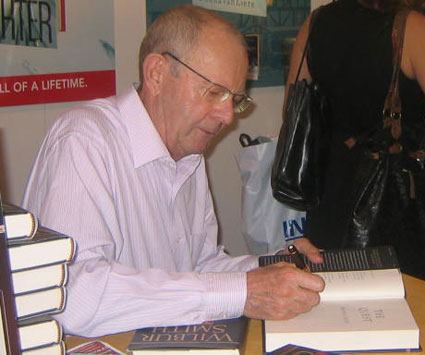After spending the morning reading and writing with his wife Niso by his side, global bestselling author Wilbur Smith passed away suddenly on Nov. 13 in Cape Town, South Africa, according to a statement on the Wilbur Smith Books website. He was 88 years old.
Wilbur Smith was a historical fiction writer from South Africa. He created novels that have enthralled readers for more than half a century; and has been regarded as the unrivaled maestro of adventure writing. At 30, Smith published his first book, When the Lion Feeds; which was released in 1964. The narrative takes place in Africa and revolves around twin brothers, Sean and Garrick.
In this spectacular adventure and drama about powerful men who took control of South Africa in the late 19th century, Smith expanded the famous “Courtney Series,” which traces an ambitious family’s adventures throughout South Africa during apartheid. It became the longest-running series in publishing history – with over a million copies sold.
However, it wasn’t all smooth sailing. His first novel, presented to publishers at the age of 27, was rejected 20 times. When he received a call from his London agency asking about his new work, Smith felt compelled to write again and began writing on another book, this time focusing on his values.
He said, “I wrote about love and loving and hating. In short, I wrote about all the things I knew well and loved better. I left out all the immature philosophies and radical politics and rebellious posturing that had been the backbone of the first novel. I even came up with a catchy title, “When the Lion Feeds.”
Hollywood
Success
You are now signed up for our newsletter
Success
Check your email to complete sign up
Immediately after his success, Smith signed a deal with Hollywood. His book was a global hit (except in South Africa, where it was banned). Smith left his profession at the tax office to devote his time to full-time writing; enabling him to complete about one book every year. He later told an interviewer, “I worked for the income tax department and as it stands now I’m still working for the damned thing.”
Diamond Hunters is one of Wilbur Smith’s books developed into motion pictures. In 1975, it came out as “The Kingfisher Caper,” and later in 2001 it was reproduced as “The Diamond Hunters.”
Smith’s other works adapted for the screen include: Shout at the Devil, (1976); The Kingfisher Caper, (1975); The Last Lion, (1972); Gold, (1974); “Mountain of Diamonds, (1991); Wild Justice, (1994); The Mercenaries, (1994) and “The Seventh Scroll” which was made into a TV miniseries by Lux International Film Company in 1999.
His 1972 bestseller “The Sunbird,” Smith wanted to create a book that “couldn’t be filmed.” It was a fascinating mix of contemporary African adventure, ancient history and archaeology.
“It was a very important book for me in my development as a writer because at that stage, I was starting to become enchanted by the lure of Hollywood. There had been some movies made from my books, and I thought, “whoa, what a way to go… All that money!” and I thought, “hold on—am I a scriptwriter or am I a real writer?”
Writing a book that could never be filmed was my declaration of independence. I made it so diffuse, with different ages, and brought characters back as different entities. It was a complex book, it gave me a great deal of pleasure, but that was the inspiration – to break free.”

In the 1980s, Smith started writing the Ballantyne Series, which detailed the family’s tribulations throughout Rhodesia’s brief history. He also drew his knowledge from extensive travels outside of Africa, which included stops in Switzerland and rural Russia. In the early ’90s, a series of mystical books set in Ancient Egypt were published. The River God remains one of his most beloved works, including On Leopard Rock, his autobiography.
He said: “I’ve had tough times, bad marriages, people I loved dearly dying in my arms, burnt the midnight oil getting nowhere, but it has, all in the end, added up to a phenomenally fulfilled and wonderful life. I want to be remembered as somebody who gave pleasure to millions.”
Smith always maintained that his first publisher motivated him and advised him to do extensive study, double-check every fact, and “write about things you know well.”
The American author Stephen King called Smith the “best historical novelist” for his work spanning from 17th-century Madagascar to the 1935 Italian invasion of Ethiopia.
“I only write about Africa,” Smith was fond of saying. When asked by an Australian fan if he would ever set a book in Australia, he replied that he might; but only after living there for 50 years.
In an interview ahead of the 2016 Hong Kong Bookfair, Smith spoke with David Tang in which he described the process of writing as a “solitary business,” and that he lives in a world of his own making; allowing him to “create characters in his head.”
Early Life
Wilbur Smith was named after one of the infamous Wright brothers; Wilbur Wright. Born on 9 January 1933, Smith’s father, Herbert Smith, was a strict disciplinarian. His mother, Elfreda, encouraged the young Wilbur to read the likes of CS Forester, Rider Haggard, and John Buchan.
Wilbur was eighteen months old when he had cerebral malaria and had to be hospitalized from possible brain damage. He said: ‘It probably helped me because I think you have to be slightly crazy to try to earn a living from writing.’ His father believed his son’s fixation on books was abnormal. Wilbur was a clandestine reader, spending hours with his favorite books in the outhouse long-drop latrine.
Wilbur started boarding school at eight years old in Pietermaritzburg, KZN. Noting his promise, his English instructor encouraged Smith, teaching him how to create dramatic effects, build characters and keep a narrative going. Wilbur began reading American author Ernest Hemingway, which influenced his writing tremendously.
At 16, he contracted polio; which the damaged hero Garrick Courtney portrays in the Courtney series.
Smith became interested in journalism while writing for his high school newspaper. Still, his father would say: “Don’t be a bloody fool, you’ll starve to death,” and insisted he get “a proper job.”
In his own words, “My father was a colonialist and I followed what he said until I was in my 20s and learned to think for myself. I didn’t want to perpetuate injustices, so I left Rhodesia in the time of Ian Smith.”
Wilbur entered university and studied commerce at Rhodes University in Grahamstown (Makhanda), becoming a chartered accountant in 1954.
Personal Life & Legacy
Smith married four times, starting at the young age of 24. His first two marriages, from which he had three children, ended in divorce. His third wife died from cancer after 28 years of marriage. One year later, in 2000, he married again.
As a wealthy and passionate conservationist, he managed his own game reserve and owned a tropical island in Seychelles. He owned property in Switzerland, Malta (MT), London and South Africa. When he wasn’t busy with writing or conservation work, he was an enthusiastic scuba diver and even held a pilot’s license.
Some contemporary works published recently were “Golden Lion (2015), a Courtney book, which was the first co-written novel to be published; Predator (2016); and Pharaoh (2016); which was responsible for bringing him back to his narrative roots- Ancient Egypt. Picadilly Press most recently released two books in 2021 for youngsters, authored by Wilbur Smith and Chris Wakling titled Cloudburst and Thunderbolt.
Smith’s literary agent Kevin Conroy Scott kindly proclaimed: “His knowledge of Africa, and his imagination knew no limitations. His work ethic and his powerful, elegant writing style made him known to millions. I cherish the role of working side by side with his wife Niso and the Wilbur and Niso Smith Foundation to keep the flame of his fictional universe alive for many years to come.”
Smith’s publisher Bonnier Books UK, Kate Parkin had said: “Wilbur never lost his appetite for writing and remained working every day of his life. He leaves behind him a treasure-trove of novels, as well as completed and yet to be published co-authored books and outlines for future stories.”















